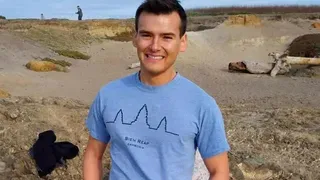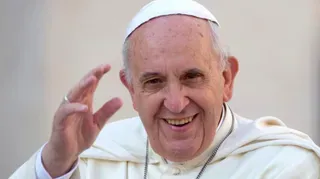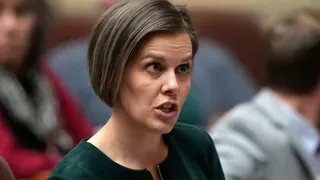February 23, 2011
Gay Immigrant Youth Struggle With Homelessness
Steve Weinstein READ TIME: 9 MIN.
This story first appeared here, at Feet in 2 Worlds, an organization dedicated to telling the stories of today's immigrants, and is reprinted with permission. Go to the group's website to read more such stories, commentary and about the issue of immigration reform.
Juan Valdez vividly recalls the night he left home.
"I grabbed a whole bunch of black plastic bags, packed all of my things, and went to my best friend's house. And, I mean, what else could I do? I was 16, I didn't know how to do anything," Juan said.
Juan was kicked out of his house when he revealed to his parents that he was gay.
Adrielle Grant has a similar story.
"I moved down to New York with [my mom], and like two weeks into the move she found out that I was gay," Adrielle said. "The drama started and she kicked me out." Adrielle (who changed his name from Leroy) was 18 when he became homeless.
The most recent survey of runaway and homeless youth in New York estimates that, each night, a minimum of 3,800 youth are homeless, more than half of whom identify as lesbian, gay, bisexual or transgender. Within the overall homeless youth population, 15 percent were born outside of the U.S. mainland. Advocates say much of the immigrant homeless youth population identifies as lesbian, gay, transgender or bisexual (LGBT).
Jim Bolas with the Empire State Coalition of Youth and Family Services led the 2007 survey of homeless youth.
"I think immigrant youth are going to be disproportionately affected because they have less resources elsewhere. I do think that immigrant youth have an additional challenge that even other homeless youth don't face," Bolas said.
For gay immigrant youth, poverty and lack of support from their families and immigrant communities make them particularly vulnerable to becoming - and staying - homeless. Margo Hirsch of the Empire State Coalition described the risks faced by these young people as a combination of poverty, cultural homophobia, religion, and a lack of community support systems.
When young LGBT people come to the U.S. and are offered the opportunity to be open about their sexuality, their families often do not follow suit, relying on behaviors and attitudes from their home countries where homosexuality may be taboo, or even violently repressed.
Juan Valdez, now 21 years old, he has been homeless off-and-on for the past five years. Juan is a quiet, gentle person with a big smile contrasted by sad, tired eyes. He wears large, horn-rimmed glasses and stylish clothing. Juan is known to be kind and friendly, a giver of big, deep hugs to staff and residents at Sylvia's Place, an LGBT drop-in shelter run by the Metropolitan Community Church of New York, where he sleeps.
When he talks about his past as a churchgoer in a religious family his mood ebbs and flows. At times, he seems detached from his painful experiences, laughing through difficult memories. Moments later, he is on the verge of tears.
Juan immigrated to Orlando, Florida from the Dominican Republic when he was a child, along with his mother, father and two brothers, Michael and Joshua. Juan's parents are Pentecostal pastors, and he had a very sheltered and strict upbringing.
"My sexuality is not accepted by my family, at all," Juan said.
"It's a lie, it's the devil, it's demons, you have to rebuke it, if you don't change your ways you're going to go to hell, you're going to burn in hell-these are the things that I've heard ever since they've known," Juan said.
Juan was 15 when he realized he was gay, but even before he came out he suffered continuous insults from family and schoolmates. Juan felt he could never live up to the masculinity other Latinos in Florida expected of him.
"I've always been feminine. My cousins would be like, 'Why are you such a pussy?' Even in school, you know, even before I said anything about my sexuality I was being called a faggot, because of who I am," Juan said.
When he was first homeless, Juan relied on friends for shelter, hopping from couch to couch, and doing what he felt was necessary to survive.
"Eventually, I did have to have sex for money; um, quite a few times. And unfortunately that's very common in gay youth that are homeless, because that's the kind of predator who's out there looking for that," Juan said.
Family is very important to Juan. He attempted to return home at 18, and renounced his sexual identity in the hope of gaining his parents' acceptance.
"I told them that I wanted to change. 'Mom I want to change, I don't want to be gay anymore. I want to come home,' " Juan said, choking back tears.
Juan's story:
After a short while, Juan found he was unable to sustain the fa�ade. "I realized that I was just lying to myself, and I was lying to everyone else. And who wants to live a lie? Life's too short," Juan said. "It is."
Again, he was thrown out. He has been homeless ever since.
"Sometimes I feel, like, that maybe, all of the times that I've been told, 'You're a faggot. I believe you're gay.' You know, maybe it got recorded into my brain or something. Sometimes I wish that's what it was so that I could cut it off and maybe my life could go a little better. Maybe I could marry a woman and have my family back, you know? But, no, that's not how it works," Juan said.
Juan vacillates between feeling sadness over the loss of his family, and happiness at having finally found a community in New York that accepts his sexuality. Even though he is homeless, he is grateful to have escaped the constant secrets, lies and persecution of his past.
"I'm among family here," he said looking around the shelter.
At support centers for LGBT homeless youth, administrators say a significant portion of their clients are immigrants. In 2010, about 10 percent of the homeless youth at Sylvia's Place were immigrants. At Green Chimneys, a transitional living program for LGBT youth, as many as 20 percent of residents were LGBT immigrants.
Sarah Wilson is a social worker at Sylvia's Place who worked with Juan Valdez.
"A lot of [LGBT youth] don't have a support system, but that's particularly true for the immigrant clients. So they really have no one to fall back on. A lot of the immigrant clients come from families who are in poverty anyway, and their families are in no position to help them out. And then, with the addition of the language barrier, that makes it even more difficult," Wilson said.
People who immigrate to the U.S. often rely heavily on support from members of their community who are already established. When LGBT immigrant youth are ostracized in their communities because of their sexuality, they find themselves without a support network and alone on the street.
That's what happened to Adrielle Grant, a 19-year-old immigrant from Guyana. He moved to the U.S. 5 years ago with his mother and sister.
Adrielle is tall and dark-skinned, and wears plastic rimmed glasses with butterfly stickers affixed to the frames. He wears fitted clothes and an argyle and glitter patterned purple New York cap. At Green Chimneys, in a sparsely furnished therapy room with broken blinds on the windows, he described the experience of coming to America.
"One afternoon me and my sister went to the store, and we came back, and my uncle took out these two suitcases, and told us start packing because we was about to go to America. And I was like "What?" We didn't even know. And so we started calling all our friends and stuff and told them we was leaving the country. The next day we went to the airport," Adrielle said.
Adrielle and his sister initially moved to Atlanta, Georgia to live with their aunt. His first year in school was very difficult.
"I didn't talk to anybody the first semester. Everyone was, like, laughing at my accent and stuff. I didn't do any talking, I just sat in the back of the class," Adrielle said. "I didn't even go to the cafeteria to eat. I just sat in the library and read books," he recalled.
Eventually high school improved for Adrielle. He made good grades, took AP classes, and even joined the tennis team. He met his first boyfriend in Atlanta, but kept his sexuality secret from his family members except for one cousin. For the first time he was open with his close friends who were very accepting.
"In middle school [in Guyana] was when I started noticing that I wasn't attracted to girls, that I was more attracted to guys. But then I couldn't do anything about it, I had to keep it inside. If I didn't, it would be big problems," Adrielle said.
Adrielle says he knew from a young age that he was gay, but he knew he could never reveal his sexuality without repercussions. He remembers a news story involving two gay men in Guyana who were murdered after publicly announcing their marriage. He also recalls violently homophobic comments made by family members, including his mother.
"[In Guyana] they don't condone gayness. Like, if you gay, they kill you," Adrielle said.
Adrielle's story:
Shortly after graduating high school, Adrielle's mother called and asked him to move to New York City. Two weeks after arriving in New York, Adrielle's mother learned that he was gay. His cousin in Atlanta had revealed the secret. Adrielle's mother responded violently.
"She said, 'You're trying to make me feel embarrassed.' And I couldn't even say anything because she was so loud and in the middle of the road," Adrielle said, describing how horrified he was by his mother's reaction. "She started, like, cursing me out every day, and she was hitting me and stuff, and saying, 'You wanna be gay?' And then she kicked me out."
Adrielle had nowhere to go, and he was terrified. He had just arrived in New York City and didn't know his way around and was traumatized by the events that had left him alone and wandering the streets of a strange city. He walked constantly, back and forth from Queens to Manhattan, afraid he would be attacked if he stopped moving. When he was too exhausted to walk any further, he found shelter in Central Park and slept on subway trains.
Adrielle was homeless for over a week before he was referred to Green Chimneys, where he is currently a resident.
The shock of being homeless has been hard for Adrielle to accept. In Guyana and Atlanta, he lived in nice homes, was very close with his family and had a lot of friends. Adrielle feels sadness and anger at having everything he knew ripped away from him and being denied the opportunity to grow and develop with family support.
Being alone in New York is still bittersweet for the 19 year old. "It makes me feel sad, and kind of happy at the same time. Because I know if I was still in my family, I would still be having to hide that I am gay. And now that I'm homeless, I can be out there like I am gay, and I'm proud of being gay," Adrielle said.
The tremendous challenges LGBT homeless immigrant youth in New York face can lead to very different outcomes. Adrielle's future is looking up. Thanks to Green Chimneys, he has housing and basic necessities. He was recently accepted to Borough of Manhattan Community College (BMCC), and began his first semester in January.
"I want to become a math teacher, so mathematics is going to be my major. I'm going to become a teacher, and teach high school and middle school, and when I get my PhD or M.A., I can go on to become a professor," Adrielle said.
Juan Valdez is less fortunate. Transitional living programs like Green Chimneys have long waiting lists and Juan has been unable to find a job despite applying daily. He is now living in the Ali Forney Center emergency shelter and struggles with crippling depression. With no money, no family or other support networks, Juan's future is precarious.
Cast out by their families and rejected by their ethnic communities, both young men have had to grow up fast. If Juan cannot find employment, it is likely that he will remain a homeless adult. Adrielle has the opportunity to pull himself out of homelessness through education and a supportive transitional housing program. However, he is completely reliant on services provided by city and community organizations, and without support from friends and family, he too has a challenging road ahead.
Von Diaz is a Feet in Two Worlds LGBT reporting fellow. Her work, and the work of other Fi2W fellows, is supported by the New York Community Trust and the John S. and James L. Knight Foundation with additional support from the Mertz Gilmore Foundation.
Steve Weinstein has been a regular correspondent for the International Herald Tribune, the Advocate, the Village Voice and Out. He has been covering the AIDS crisis since the early '80s, when he began his career. He is the author of "The Q Guide to Fire Island" (Alyson, 2007).







